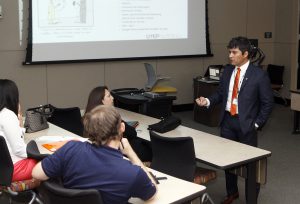By Laura L. Acosta
UTEP News Service
The University of Texas at El Paso’s School of Nursing has launched an ambitious leadership program for emerging health care leaders in the Paso del Norte region.

The new Nursing and Health Care Leadership Institute (NHCLI) will administer an inter-professional leadership development academy that will provide the next generation of health care leaders, including chief nursing officers, nurse managers and nursing supervisors, with effective leadership development approaches that are necessary to sustain health care organizations, enhance patient care and improve health outcomes.
The announcement was made during the School of Nursing’s Centennial Conference on Health Care Leadership May 9 in the Health Sciences and Nursing Building.
“The launching of the innovative NHCLI during UTEP’s Centennial Celebration is a testament to the longstanding commitment of UTEP’s School of Nursing to the El Paso community,” said UTEP School of Nursing Dean Elias Provencio-Vasquez, Ph.D. “The goal of the NHCLI is to prepare nurses and health care providers and practitioners with the essential skills needed to provide leadership within their organizations in this ever-changing health care environment.”
The NHCLI will involve faculty from engineering, psychology, English, business and nursing, and offer classes and training programs based on evidence-based approaches identified through research focused on health care professions’ leadership theory. The NCHLI research also will focus on resolving translational challenges between science and practice.
The NHCLI educational program will complement the curricula from the School of Nursing’s undergraduate and graduate programs, which include the Bachelor of Science in Nursing, Master of Science in Nursing and the Doctor of Nursing Practice. The institute aims to prepare health care managers to build effective teams, resolve strategic problems, drive change through the organization, and ultimately get to the next level of patient care via a comprehensive understanding of complex systems, organizational theory, financial management and hands-on leadership practice.
“Building on UTEP’s strong background on leadership scholarship, the NHCLI is ideally positioned to support our regional health care community in meeting the leadership development challenge,” said Hector Olvera, Ph.D., research assistant professor at UTEP’s Center for Environmental Resource Management and a faculty member in the School of Nursing.
As part of the NHCLI, the School of Nursing also will start an honors leadership program for nursing students to emphasize leadership training. The program is expected to enhance the preparation of students and improve the leadership capacity of graduates.
“I think (the institute) is great,” said Jasmine McGee, a director at Del Sol Medical Center who attended the leadership conference. “Anytime you can learn from others, connect with each other, build that type of relationship with the community and with other hospitals, other leaders, and other nurses from different fields that relate to health care, that’s powerful.”
The Centennial Conference on Health Care Leadership brought together regional, national and international health care professionals to discuss the opportunities and challenges nurses and other health care professionals face in today’s rapidly changing environment.
Participants attended seminars on selected leadership topics that are highly relevant to the regional health care community including, “Culture of Civility and Respect: A Nurse Leader’s Role” and “Evidence-Based Leadership Development Programs for Health Care Professionals.”
“(This conference) was really about bringing people interested in health care together and to really start thinking about how we can drive the transformation that is so pertinent in health care,” Olvera told participants. “This conference is really to start a dialogue between the professionals and academia and what we can do to support you as you lead the transformation of health care.”
Keynote speakers included Tilda Shalof, an intensive care unit nurse for 30 years who has shared her experiences through her books, A Nurse’s Story, The Making of a Nurse, Camp Nurse, Lives in the Balance and Opening My Heart; and Lee A. Schmidt, Ph.D., associate professor and senior associate dean of academic affairs and director of the Ph.D. program at Loyola University.
“If you see a nurse who you think is exemplary, go up to that nurse and privately or publically identify that nurse as a nurse leader,” Shalof said. “They almost always say, ‘I’m not a leader.’ I think it’s a nurse thing. Most nurses eschew that title. They do not take that title on. You have to identify yourself as a leader to be a leader.”
UTEP President Diana Natalicio told participants that the first step to becoming a leader is being willing to take on a leadership role.
“Not everybody wants to do that,” President Natalicio said. “Not everybody has the capacity to do that. As leaders, I think one of the things that I always remember is that there’s a void. There’s a place where you need to step up and provide a direction that maybe others are either not willing or able to do. I can’t think of an area that is more critically in need of leadership than health professions at this point.”
Janalin Ciparro, medical director at Del Sol Medical Center, said the best way to lead is by example.
“We’re not just reiterating to our staff what is best practice,” Ciparro said. “We actually are leaders that would like to give them the tools through our examples. I’m a young leader and this conference has really given me some insight how I should develop and incorporate my vision into the vision of the hospital because not all of us leaders lead the same way.”
The conference capped off National Nurses Week at UTEP. Other activities included the signing of a proclamation by the El Paso City Council, which designated the week of May 6-12, 2014 as National Nurses Week in the City of El Paso.
The school also welcomed Brian Cuban, a successful lawyer, activist and TV host, who talked about his personal battle with a mental disorder known as Body Dysmorphic Disorder.